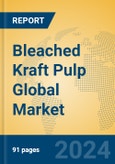Market Overview
Bleached kraft pulp is produced through the kraft process, which involves the treatment of wood chips with caustic soda and sodium sulfide to separate the cellulose fibers from lignin and hemicellulose. The resulting pulp is then bleached to enhance its brightness and purity. This form of pulp is favored for its strength and durability, making it ideal for applications in various paper products.The bleached kraft pulp market has been witnessing significant growth, driven by rising demand from the paper and packaging industries. Increasing preference for sustainable and recyclable materials has further propelled the adoption of bleached kraft pulp. The market size was valued at approximately $35 billion in 2023 and is expected to grow at a CAGR of 5.2% from 2024 to 2029, reaching an estimated $50 billion by the end of the forecast period.
Market Size and Share Analysis
Market Size
In terms of volume, the global bleached kraft pulp market reached 20 million metric tons in 2023. The substantial growth in the consumption of paper products, particularly in emerging economies, is boosting market size. Furthermore, increased investments in sustainable forestry practices are contributing to the availability of quality pulp.Market Share Analysis By Product Type
- Softwood Kraft Pulp: Holds a market share of around 60%, largely due to its higher fiber length and strength, making it suitable for high-strength applications such as linerboard and sack paper.
- Hardwood Kraft Pulp: Represents approximately 40% of the market. It is preferred for producing finer grades of paper due to its lower fiber length, which enhances printability.
Trends Analysis
The trend towards sustainability is reshaping the bleached kraft pulp market. Companies are increasingly investing in eco-friendly production processes and seeking sources of wood fiber that comply with environmental standards. Additionally, the rise of digital content consumption has led to a shift in demand from traditional paper products to packaging materials, which is influencing the dynamics of the bleached kraft pulp market.Key Players
The competitive landscape of the bleached kraft pulp market features several key players, including:- Canfor Pulp: A prominent Canadian producer known for its sustainable forestry practices.
- Stora Enso: A Finnish-Swedish multinational company, leading in renewable materials.
- Mets Fibre: A major Finnish pulp producer focusing on high-quality products and sustainability.
- Ilim: One of Russia's largest producers, known for its significant export volume.
- Sdra Cell: A Swedish company renowned for its innovative approach to pulp production.
- Paper Excellence: A major North American player with a diverse range of products.
- Mercer International: Focuses on the production of high-quality bleached pulp for various applications.
By Process
Bleached kraft pulp is primarily produced using the kraft process. This method is favored for its economical and efficient production capabilities, producing pulp with high yields and low environmental impact. Increasingly, manufacturers are adopting advanced bleaching technologies to minimize chemical usage and enhance pulp quality.By Application
- Publication Paper: This segment accounts for around 40% of the market share, driven by demand for printed materials in education and advertising.
- Tissues: Holding a share of approximately 30%, this segment is growing due to the rising consumer preference for high-quality tissue products.
- Others: Encompassing various paper products and packaging applications, this segment contributes an estimated 30% to the market.
By End-Use
The end-use industries significantly influence the bleached kraft pulp market. Major sectors include:- Packaging: Driven by the e-commerce boom, the packaging industry is witnessing robust demand for durable and sustainable materials.
- Print Media: While experiencing a decline, print media is still a significant consumer of bleached kraft pulp.
- Household Products: The increasing demand for hygienic tissue and personal care products fuels the growth of this sector.
By Region
The geographical analysis indicates notable differences in market dynamics:- North America: Dominates the market with a share of 40% attributed to high consumption levels and presence of key players.
- Europe: Accounts for approximately 30% of the global market, driven by strict environmental regulations and sustainable practices.
- Asia-Pacific: Expected to witness the highest growth rate of 6.5% CAGR, fueled by rising demand in emerging economies such as China and India.
- Latin America: Holds about 15% of the market share, bolstered by the growth in the pulp industry in Brazil.
- Middle East and Africa: Represents a smaller segment, around 5%, but is gradually increasing due to industrial developments.
Market News and Policy Updates
The bleached kraft pulp market is being influenced by various policies aimed at promoting sustainability and reducing carbon footprints. Recent initiatives in several countries include:- The European Union's Green Deal, which aims to make Europe the first climate-neutral continent by 2050.
- China's new regulations to limit pollution from manufacturing processes, encouraging investment in cleaner technologies.
- North America's continued push for sustainable forestry practices and responsible sourcing.
Segment Forecasts: 2024 - 2029
Forecasts for the bleached kraft pulp market indicate continued growth across several segments:- The softwood kraft pulp segment is anticipated to maintain its leadership status, projected to grow at a CAGR of 5.5% during the forecast period.
- The hardwood kraft pulp segment is expected to expand at a CAGR of 4.5%, supported by increased applications in high-quality paper manufacturing.
- The tissues segment within applications is forecasted to grow at a CAGR of 6%, driven by rising consumer demand for hygienic products.
Conclusion
Overall, the bleached kraft pulp market is poised for significant growth in the coming years, propelled by demand from diverse applications, sustainability trends, and innovations in production processes. Key players are adapting to these dynamics by enhancing the quality of their products and aligning with environmental policies. The market's future looks promising, with ample opportunities for growth and development in the years leading to 2029.This product will be delivered within 1-3 business days.
Table of Contents
Companies Mentioned
- Canfor Pulp
- Stora Enso
- Metsä Fibre
- Ilim
- Södra Cell
- Paper Excellence
- Mercer International








